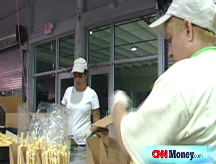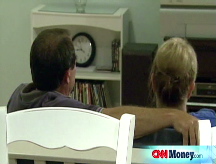Poll: 60% say depression 'likely'
Poll finds 6 of 10 believe a depression is somewhat or very likely - seeing 25% unemployed and millions homeless and hungry.
NEW YORK (CNNMoney.com) -- Nearly six out of ten Americans believe another economic depression is likely, according to a poll released Monday.
The CNN/Opinion Research Corp. poll, which surveyed more than 1,000 Americans over the weekend, cited common measures of the economic pain of the 1930s:
- 25% unemployment rate;
- widespread bank failures; and
- millions of Americans homeless and unable to feed their families.
In response, 21% of those polled say that a depression is very likely and another 38% say it is somewhat likely.
The poll also found that 29% feel a depression is not very likely, while 13% believe it is not likely at all.
But economists, even many who feel current economic risks are dire, generally don't believe another depression is likely.
"We've been in a recession all year and it's going to get worse," said Anirvan Banerji, director of research for the Economic Cycle Research Institute. "We're going from a relatively mild recession to a more painful recession. But we're a long, long way from a depression."
A survey taken last week by the National Association of Business Economists asked members what would happen if the $700 billion bailout that passed Friday fails to fix frozen credit markets. The consensus forecast of those economists was that, even if continued problems choke off credit to businesses and consumers, unemployment would rise to just 7% in the second quarter of next year .
Other economists recently contacted by CNNMoney.com said that the unemployment rate could rise as high as 10% to 12% next year if the bailout does not work. While that could be roughly double the current 6.1% unemployment rate, it would be only half of the worst rate seen in the Great Depression of the 1930s.
Banerji's worst-case scenario sees unemployment topping out at just under 10%. That's one of the key reasons that he thinks a true depression is unlikely.
"A depression rate would imply more than doubling or tripling the current unemployment rate," he said.
The Great Depression also saw the gross domestic product, the broad measure of the nation's economic activity, plunge by 13% in 1932.
The NABE survey forecast that GDP will drop 1.1% in the fourth quarter of 2008 if the bailout does not get credit flowing again, and another 0.5% in the first quarter of next year. The economists surveyed by CNNMoney.com said they could foresee a drop of 2% to 4% in a worst-case scenario.
Part of the reason for the far less severe economic pain expected this time are the social safety net programs - including Social Security, unemployment insurance and insurance on bank deposits - that were not in place at the start of the Great Depression.
And experts believe that the Federal Reserve and other officials made many policy mistakes during the Depression that are not likely to be repeated. In fact, the Fed at that time kept lending tight, while today's Fed is pumping hundreds of billions of dollars into the banking system to try to restart lending and spur economic activity.
"The fact is that central banks around the globe will move heaven and earth to avoid having a depression," said Banerji.
Still, other findings of the CNN poll were more in agreement with those of top economists.
The poll found 84% of Americans polled believe that economic conditions are somewhat or very poor, with a majority, 53%, now believing the economy is very poor. That's not far off from the two-thirds of NABE economists who believe the economy is now in a recession or will enter one by the end of this year.
The view of the economy is much bleaker than a comparable CNN/USA Today poll found during the last economic downturn at the start of the decade. During the recession of 2001, only one-third to one-half of those polled felt economic conditions were somewhat or very poor.
Unemployment continued to rise after the recession ended in late 2001, and not surprisingly the view of the economy continued to deteriorate. But at its worst, in a February 2003 poll, only two-thirds of those surveyed described the economy as somewhat or very poor. Just 25% of those surveyed at that time described the economy as very poor, or less than half the level who believe that today.
In addition, the CNN poll released Monday found that 36% believe the current crisis in the nation's financial sector will affect them immediately, while another 19% expect to be affected within the next year. Only 8% believe they will never be affected by the crisis.
Treasury Secretary Henry Paulson and Fed Chairman Ben Bernanke have frequently warned in recent weeks that the credit crisis would be felt on Main Street, not just on Wall Street.
And Banerji said that the increasingly grim view of the economy will by itself lead to cutbacks in spending by both consumers and businesses. That in turn will result in greater job losses and more economic pain.
"The fact that the majority of people believe we are going into a depression ensures that the recession will get worse," Banerji said. ![]()



